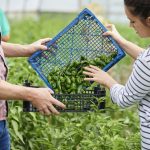As the world grapples with the escalating challenges posed by climate change, various sectors are searching for sustainable solutions that can mitigate its impacts. One such solution lies in organic farming—a method of agricultural production that prioritizes environmental health, biodiversity, and sustainability. This article explores the role of organic farming in climate change mitigation, focusing on its impacts, practices that enhance soil health and biodiversity, economic benefits to farmers, and necessary policy recommendations to bolster organic agriculture.
Understanding Organic Farming’s Impact on Climate Change
Organic farming is intrinsically linked to climate change mitigation due to its focus on reducing greenhouse gas emissions and enhancing carbon sequestration. Unlike conventional agriculture, which often relies on synthetic fertilizers and pesticides, organic farming employs natural inputs and practices that can significantly lower the carbon footprint of food production. By cultivating crops and raising livestock through methods that prioritize natural processes, organic farming can contribute to a more resilient food system that is less reliant on fossil fuels.
Research indicates that organic farming practices can sequester carbon in soils, converting agricultural land into carbon sinks. By promoting the use of cover crops, crop rotations, and reduced tillage, organic farmers enhance the soil’s organic matter content, which plays a crucial role in storing carbon. Furthermore, the reduction of synthetic inputs minimizes nitrous oxide emissions, a potent greenhouse gas associated with nitrogen fertilizers. The cumulative impact of these practices can lead to a significant reduction in the overall greenhouse gas emissions from the agricultural sector.
Moreover, organic farming promotes local food systems, which reduces transportation emissions and supports community resilience. By sourcing food closer to the point of consumption, organic farming can minimize the carbon footprint associated with long-distance food transport. In this way, organic farming not only counters climate change but also fosters a more sustainable and equitable food distribution system that supports local economies.
How Organic Practices Enhance Soil Health and Biodiversity
The health of soil is foundational to sustainable agriculture and has profound implications for climate change mitigation. Organic farming practices enhance soil health by focusing on the use of organic amendments, such as compost and cover crops, which improve soil structure, fertility, and microbial diversity. Healthy soils are better equipped to retain moisture and nutrients, reducing the need for irrigation and synthetic fertilizers. This increased resilience is critical in the face of climate-related stressors, such as droughts and floods.
Biodiversity is another hallmark of organic farming that plays a vital role in climate change mitigation. By promoting diverse cropping systems and agroecological practices, organic farming supports a wider range of species, from beneficial insects to soil microorganisms. This biodiversity enhances ecosystem services such as pollination, pest control, and nutrient cycling, which further contribute to agricultural resilience. Healthy ecosystems are better able to adapt to climate challenges, making them crucial in the fight against climate change.
In addition, organic farming promotes the conservation of native species and habitats, which are often threatened by industrial agriculture. By creating buffers and wildlife corridors within agricultural landscapes, organic farmers help maintain biodiversity and ecological integrity. These practices not only support the environment but also enhance the overall sustainability of food systems, making organic farming a pivotal player in climate change mitigation efforts.
The Economic Benefits of Organic Farming for Farmers
The transition to organic farming can yield significant economic benefits for farmers, making it an attractive option in the context of climate change. Organic products often command higher prices in the marketplace due to increased consumer demand for sustainably produced food. This premium pricing can enhance farmers’ profitability and provide them with a more stable income, which is especially important in an era of fluctuating commodity prices.
Additionally, organic farming reduces dependency on costly synthetic inputs, offering another avenue for economic savings. By utilizing natural fertilizers and pest management strategies, organic farmers can lower their operational costs over time. This independence from volatile chemical markets allows farmers to invest more in their land and communities, fostering a more sustainable agricultural system.
Moreover, the growth of the organic market has spurred job creation and economic opportunities in rural areas. As demand for organic products increases, so does the need for processing, distribution, and retail services, leading to a more vibrant local economy. By investing in organic farming, communities can bolster their economic resilience while simultaneously addressing the urgent challenges of climate change.
Policy Recommendations to Support Organic Agriculture Growth
To harness the full potential of organic farming in climate change mitigation, targeted policy measures are essential. Governments should prioritize the development of incentives and financial support for farmers transitioning to organic practices. This could include grants, low-interest loans, and subsidies that offset the initial costs associated with organic certification and infrastructure development. Such financial assistance would encourage more farmers to adopt sustainable practices that benefit the environment.
Additionally, establishing educational programs and resources for farmers can facilitate the transition to organic methods. Training initiatives that focus on organic farming techniques, soil health, and pest management can empower farmers to make informed decisions that enhance sustainability and resilience. Knowledge-sharing platforms can connect farmers with experts and fellow organic producers, fostering a supportive community that drives innovation and best practices in organic agriculture.
Finally, enhancing market access for organic products is vital to support the growth of this sector. Policies that promote local food systems, such as farm-to-school programs, can improve the viability of organic farming while ensuring that consumers have access to fresh, sustainably produced food. By prioritizing organic agriculture in policy frameworks, governments can play a crucial role in addressing climate change while supporting farmers and rural communities.
Organic farming stands out as a promising solution in the quest to mitigate climate change while promoting sustainable agricultural practices. By enhancing soil health, fostering biodiversity, and providing economic benefits to farmers, organic farming offers a multifaceted approach to addressing environmental challenges. However, to realize its full potential, concerted efforts from policymakers, consumers, and the agricultural community are required to create an ecosystem that supports and incentivizes organic practices. By embracing organic agriculture, we can take a significant step toward a more sustainable and resilient future.








